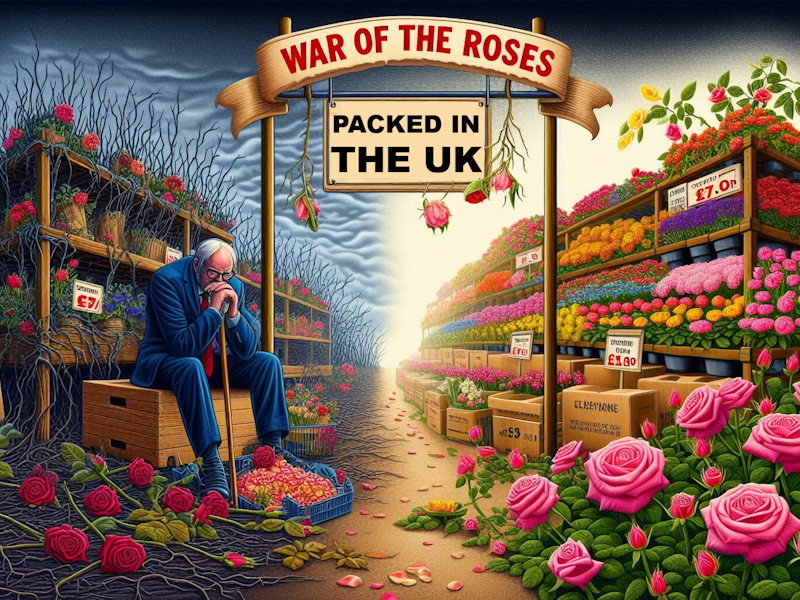The UK's Lost War of the Roses:
The Battle for Britain's Flowers:
For hundreds of years, Britain’s flower industry was a thriving, local affair. Thousands of Independent greengrocers sold freshly cut blooms—roses, narcissi, violets—sourced just a few miles away. These flowers weren't just beautiful, they were part of the fabric of the local economy, supporting thousands of growers and tens of thousands of local jobs. But today, this once-vibrant industry is nearly unrecognizable, its roots all but severed by the dominance of supermarkets and global supply chains.
At Getslocal, we are passionate about helping communities and local businesses grow and thrive. However, the story of Britain's flower industry highlights how unchecked corporate power—like that of large supermarkets—can destroy long-standing industries, erode local economies, and even harm distant communities. Here, we explore how Britain's flower industry has been devastated by supermarket giants and how the choices consumers make are part of a larger, global problem.
The Decline of UK Flower Growers:
A Story of Dutch Dominance:
The seeds of this decline were sown in the 1950s, when the Dutch government began heavily subsidising its own flower industry. This government-backed investment allowed Dutch flower growers to adopt cutting-edge technology, such as high-tech greenhouses and temperature-controlled storage, enabling them to produce and transport flowers more efficiently than their British counterparts. By the 1980s, fleets of "Flying Dutchman" lorries crisscrossed Europe, delivering fresh flowers from the Netherlands to countries like the UK in record time.
Meanwhile, Britain’s flower industry couldn’t keep up. Local growers who had been cultivating seasonal flowers for generations were now facing competition they couldn’t match. The Dutch were producing flowers year-round, flooding the UK market with cheap imports, and squeezing out local growers. The British flower industry, once a cornerstone of rural economies, began to wilt under the pressure.
The Kenyan Takeover:
Cheap Roses, Hidden Costs:
Fast forward to today, and the Dutch dominance is facing its own existential threat. Now, it's Kenya—a country with ideal growing conditions and extremely low labor costs—that is taking over the global flower trade. Kenyan roses can be grown year-round and sold for as little as £0.10 per stem, a price that no European grower can compete with. Dutch roses, by comparison, are priced at around £0.40 per stem.
Distance and Deceptive Marketing:
While these Kenyan flowers may be cheap, they come with a hidden price tag. Flowers grown in Kenya must travel nearly 12,000 kilometers to reach supermarket shelves in the UK, leaving a significant carbon footprint. Yet, supermarkets use deceptive labels like "Packed in the UK" to give the impression that these flowers are local. Consumers are often unaware that the flowers in their shopping cart have traveled halfway around the world, contributing to pollution and environmental damage.
Even more troubling is the human cost:
Around 70% of the workforce on Kenyan flower farms are women, many of whom earn as little as £60 per month—less than Kenya’s minimum wage. These workers are exposed to dangerous chemicals, work long hours in difficult conditions, and have little job security. Yet, supermarkets continue to source flowers from Kenya, driven by the demand for cheap, year-round blooms.
THE ROLE OF Supermarkets:
The Architects of Decline:
The power of supermarkets cannot be overstated when it comes to the collapse of Britain’s local flower industry. Their relentless drive for low prices and consistency has decimated local growers, forcing them out of business while benefiting from cheaper international sources. Supermarkets demand flowers 365 days a year, irrespective of seasonality, and this constant demand for supply means that flowers must be sourced from warmer climates, like Kenya, where labour and environmental costs are lower.
NOT, Packed in the UK!
The marketing strategies supermarkets use only add to the problem. Labels like “Produced in the UK” or “Packed in the UK” are misleading at best, as they obscure the fact that many of these flowers are grown thousands of miles away. This deceptive marketing allows supermarkets to present imported flowers as a domestic product, further undermining the already struggling British flower industry.
The closure of Cants of Colchester, one of Britain’s oldest rose farms, is a stark example of the damage this system has caused. Established in 1765, Cants closed its doors in 2023, citing overwhelming competition from imported flowers, rising costs, and decreasing customer foot traffic as key reasons for their decision. This historic business, which had been part of Britain’s floral landscape for over two centuries, could no longer survive in a market dominated by cheap imports and supermarket monopolies.
Consumers Have a Choice:
Supporting Local and Seasonal Flowers
At Getslocal, we believe in the power of local communities, and the story of Britain’s flower industry serves as a reminder of the importance of supporting local businesses. Every time you choose to buy British-grown, seasonal flowers, you are making a conscious decision to support local growers, reduce carbon emissions, and contribute to the sustainability of the flower industry.
Buying in their own interests:
It is important to realize that cheap flowers often come with high hidden costs—both to the environment and to the people who grow them. By demanding transparency from supermarkets and choosing flowers that are grown locally and ethically, consumers can play a critical role in revitalizing Britain’s flower industry.
Reviving the UK Flower Industry:
So how do we move forward?
First, consumers must be educated about the true cost of the flowers they purchase. By choosing seasonal, locally sourced blooms, consumers can help bring back British flower farms and contribute to a healthier, more sustainable supply chain. Supporting local growers also means reducing reliance on environmentally harmful international supply chains, and ensuring that workers are paid fairly for their labour.
Transparency and Honest labelling!
Second, we need stronger regulations to ensure transparency in labeling and sourcing practices. Supermarkets should be held accountable for where they source their flowers and how they market them. Labels that mislead consumers into believing they are buying British-grown flowers must be eliminated.
Finally, government intervention could help local flower growers regain their footing, much as the Dutch government supported its own flower industry in the 1950s. Policies that encourage domestic production, alongside consumer demand for local, seasonal flowers, could help the UK’s flower industry blossom once again.
The Lost Battle of Britain’s Flower Industry:
The story of Britain’s flower industry is a another cautionary tale of what happens when corporate power, global supply chains, and unchecked consumer demand destroy local economies. But the battle isn’t over. By supporting local growers, choosing seasonal flowers, and demanding transparency from supermarkets, we can help restore Britain’s flower industry to its former glory.
At Getslocal, we are committed to helping local businesses thrive. The future of Britain’s floristry industry depends on the actions we take today. By making conscious, informed choices, we can ensure that Britain’s flower farms, and all the beauty they bring, aren’t lost forever. Let’s reclaim the lost battle of Britain’s flower industry and support the growers who have long been the lifeblood of our communities.


